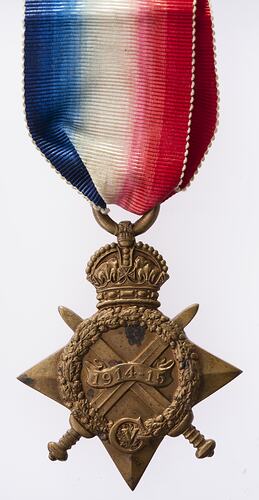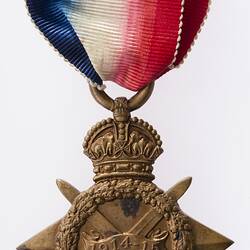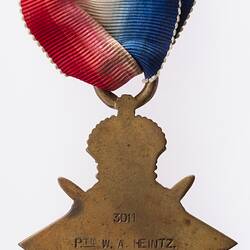Summary
1914-15 Star medal awarded to Pte. William Armstrong Heintz, service number 3011, 6th Battalion, A.I.F., for service in World War I.
Private Heintz was born in Hamilton, Victoria, and was a labourer when he joined on 22 September 1915 aged 23 years and 8 months. His mother, Josephine Andrews resided in Port Melbourne before locating in 1919 to Austral Avenue, Brunswick. Heintz embarked from Melbourne on 29 September 1915 on the HMAT Osterley. In1916 he was in Egypt and by August 1916 he was in France. He suffered from shingles and herpes as well as trench fever and scabies by 15 December 1917. Heintz had been awarded the Military Medal for operations east of Zonnezbeke on 28-30 October 1917. He carried messages through heavy barrages, guided relieving troops to their positions through heavy artillery, and retrieved 2 missing platoons on 9 August 1918. Private Heintz was killed in action in France and is buried at Rosieres.
The 1914-15 Star was authorised in 1918 to be awarded to those who saw service between 5 August 1914 and 31 December 1915 (excluding those who were eligible for the 1914 Star) - 2,350,000 were issued.
Physical Description
Bronze four point star medal 'ensigned' by a crown. Ribbon is striped in the three colours of the Empire which are shaded and watered.
Obverse Description
Four pointed star with the top point replaced by a crown with attached loop and ribbon, crossed swords project between the points of the star and at the centre, within an oak wreath, a scroll crossing the swords reads '1914-15'; at the base of the wreath is a large 'G' which encloses a 'V' (King George V).
Reverse Description
Stamped; '3011 PTE. W.A. HEINTZ. 6 / BN. A.I.F.'.
Edge Description
Plain.
More Information
-
Collection Names
-
Collecting Areas
-
Acquisition Information
Donation from Victorian Branch, Returned & Services League of Australia Limited (RSL), A. Reid, 24 Feb 1986
-
Date Issued
1918 AD
-
Issued By
-
Awarded To
Private William A. Heintz, Australia
3011 Pte W.A. Heintz, 6th Battalion, A.I.F. -
Inscriptions
Obverse; '1914 - 15 / GV' (King George V). Reverse; '3011 PTE. W.A. HEINTZ. 6 / BN. A.I.F.'.
-
Material
Bronze
-
Axis
12
-
Classification
-
Category
-
Discipline
-
Type of item
-
Overall Dimensions
45 mm (Width), 62 mm (Height)
Height to top of suspension ring.
-
Shape
Star with loop and ribbon
-
References
[Book] Joslin, E C., et al. 1988. British Battles and Medals., 227 Pages
-
Keywords


